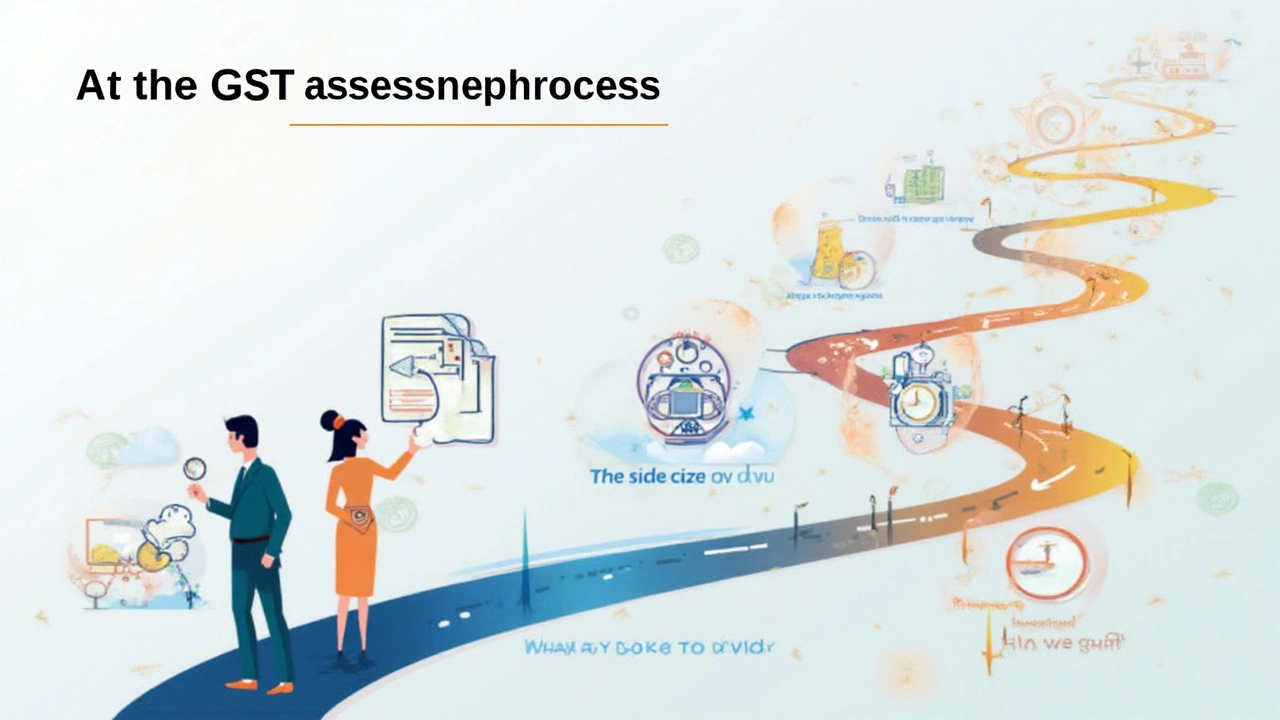So, you're thinking about handling your own GST assessment? Good for you! It might sound tricky, but with a little guidance, it's definitely doable.
First things first, let's talk about what GST actually is. GST, or Goods and Services Tax, is a value-added tax applied to most goods and services sold for domestic consumption. It’s a streamlined way for the government to collect revenue. Sounds straightforward enough, right?
Now, the idea of self-assessment is like taking a DIY approach to your taxes. It means you’re responsible for figuring out how much GST you owe or should be refunded. You’ll have to get your hands a bit dirty with numbers, but it can be empowering too.
Wondering how to get started? Think of it as baking a cake. You need to have the right ingredients (documents and receipts), follow the recipe (GST regulations), and check the oven now and then (polish up your math) to make sure everything turns out great!
- What is GST?
- Understanding Self-Assessment in GST
- Steps to Self-Assess Your GST
- Common Mistakes to Avoid
- Tips for Accurate GST Filing
- When to Seek Professional Help
What is GST?
You’ve probably heard the term GST thrown around quite a bit, but what does it really mean? GST stands for Goods and Services Tax, and it's a unified tax system that replaced a bunch of messy indirect taxes, making life a bit easier for businesses and consumers alike.
In simple terms, GST is a consumption tax charged on most goods and services sold for domestic use. You can think of it as a way to ensure everyone pays their fair share in taxes on the stuff they buy. This isn't just a local gig, either; many countries around the world use a similar system because it's less of a headache for everyone involved.
Now, here’s where it gets a bit more specific: GST is a multi-stage tax that's collected at each point of sale, but ultimately, it's the consumer who bears the full cost. How? Well, businesses can reclaim the GST they pay on business-related expenses, meaning it's passed on to the end consumer. Pretty neat, huh?
Want to know a fun fact? According to a survey, GST accounts for a significant portion of tax revenues in many countries, often ranging from 5% to 18% of the price of goods and services. Its implementation in places like Canada and Australia has shown significant boosts to government revenue while simplifying the tax structure.
So, why does this matter to you? If you're a business owner, understanding GST is crucial for pricing your products correctly and ensuring compliance with tax regulations. And if you're just a regular consumer, it helps to know why prices are the way they are when you hit the checkout.
Understanding Self-Assessment in GST
Imagine you're your own boss when it comes to your GST. Hit the breaks! It comes with a bit of responsibility, but it’s not rocket science. Self-assessment means you calculate your own taxes instead of waiting for the tax office to tell you what you owe.
Here's how it plays out. Every business that earns above a certain threshold has to register for GST. You're then required to keep track of all the taxable sales and purchases over a specific period, usually quarterly or monthly. This helps you figure out how much GST you need to charge your customers and what's claimable for input tax credits.
Let’s break it down:
- GST Collected: This is the GST you charge your customers. Every time you make a taxable sale, add GST to the price. Simple math, right?
- Input Tax Credits: This is the GST you pay on purchases or expenses for your business. Think of it as a refund you can claim back.
The difference between these two numbers is what you either owe the government or what you get back.
Now, the cool part about doing this yourself is the control it gives you. You get to understand every nook and cranny of your business better. But a word to the wise: keep everything documented. Whether it’s digital or good ol' paper, records are king.
If it sounds overwhelming, consider starting small or seeking some online courses specifically tailored for self-assessment newbies. Some stats say that leveraging software tools effectively can boost accuracy and cut down filing time by up to 50%.
Steps to Self-Assess Your GST
Alright, let's break down how you can self-assess your GST like a pro. It's kind of like following a recipe, so buckle up and let's go step by step.
- Gather Your Documents: First things first, you need all your invoices, bills of sale, and expense receipts. These are crucial for calculating how much GST you owe or can claim back. Keep everything organized—an online folder or an app like expense trackers can really help.
- Calculate Your GST Payable: This is what you owe to the government. You do this by summing up all the GST you've charged your customers. Fairly simple, right?
- Calculate GST Input Credits: Here's the fun part—you can actually claim GST credits for the GST you've paid on your business purchases. Make sure to cross-check that you've claimed the correct amounts. A little attention here can save you a bunch.
- Net GST: Now, subtract your GST input credits from your GST payable. If you owe more than you claimed, you pay the difference. If it's the other way around, you might get a nice refund!
- File Your GST Return: Use the online portal to submit your GST return. Make sure everything adds up, and double-check those numbers before hitting that submit button.
- Stay Compliant: Keep all your records safely stored as you might need to present them during audits. The rule of thumb is to keep records for at least five years.
See, when you break it down, self-assessing your GST isn't as scary as it sounds. Just take it one step at a time and you'll be in control of your tax filing like a boss.

Common Mistakes to Avoid
Jumping into GST filing without knowing the pitfalls can lead to headaches. Let's dive into some typical blunders you want to dodge.
First off, make sure your records are complete and up-to-date. Failing to maintain accurate records of sales, purchases, and expenses is a big no-no. Keep those receipts and invoices handy. Trust me; it'll save you a lot of stress later.
Another thing people often mess up is misclassifying transactions. Ensure you're grouping sales and purchases correctly. Misclassification can cause discrepancies, leading to incorrect tax calculations. If you're ever in doubt, a quick check with gst guidelines can clear the air.
Ever noticed how time flies? Missing deadlines is another common hiccup. GST filing is all about timing. Keep track of due dates to avoid late fees or penalties. Set reminders, mark your calendar, do whatever works best to stay on top of it.
Let's not forget about errors in claiming credits. People sometimes claim more Input Tax Credit (ITC) than they're entitled to or completely forget to claim it. Be careful to double-check your claims if they match your entries.
Here's a quick wrap-up of what to watch out for:
- Incomplete or inaccurate record-keeping
- Misclassifying transactions
- Missing filing deadlines
- Errors in Input Tax Credit claims
Avoid these common mistakes, and the GST process will seem much less daunting. Remember, keeping things tidy and timely is key. If you control these parts, the rest will fall into place more smoothly.
Tips for Accurate GST Filing
Feeling a bit lost with this whole GST thing? Don’t worry, you’re not alone. Getting it right means being a little organized and a bit informed. Let's break down some basic yet crucial tips to make sure your GST filing process doesn’t turn into a headache.
First up, keep your records squeaky clean. When it comes to taxes, being a bit of a neat freak can really pay off. Store your invoices, statements, and receipts in an orderly fashion. Some folks find it handy to use digital tools or apps to keep track, so everything's easily accessible when needed.
- Remember to file on time. Deadlines are there for a reason, right? Late filing can lead to penalties, and nobody wants that.
- Reconcile regularly. Match up your reported sales with the actual numbers. This helps spot any discrepancies early.
- If you're claiming GST credits, ensure those expenses are GST-eligible. Not every purchase qualifies, so don’t assume it does.
Here’s a golden nugget of advice from tax expert Lisa Sims:
"Accuracy is everything. Double-check every entry. A minor mistake can lead to a major issue."
Another thing: keep up with GST rule updates. Tax laws can change, and staying informed means you're not caught off guard.
- If you're confused, refer to your tax agency's online resources or consider a consultation with a professional. Sometimes spending that extra buck can save you a lot down the road.
Finally, don't ignore the power of a good spreadsheet. Old-school? Maybe. But it helps break down costs, sales, and taxes into visual bits that are easier to digest.
And that’s pretty much it! Stick to these tips, keep it simple, and you’re likely to have a smoother ride with your GST. And if things still feel overwhelming, remember that pro help is just a phone call away.
When to Seek Professional Help
Alright, handling your own GST can boost your confidence, but let’s be honest, there are times when a pro can save you from potential headaches. Wondering when to call in the cavalry? Well, it's all about knowing your limits.
First off, if you’re dealing with complex business transactions or multiple revenue streams, that's a solid cue to get help. A GST expert can navigate the intricacies better than most of us.
Next, if audits give you nightmares, professionals know the drill. They understand exactly what the tax folks are looking for and can check your work before filing.
If you’re feeling overwhelmed by paperwork or find that numbers just aren’t your thing, it’s wise to invest in expert help. It’s like having a GPS on a road trip instead of just winging it.
- Multiple Revenue Streams: Handling different income sources can get complicated. An expert can ensure that everything is properly categorized and reported.
- Frequent Legislation Changes: Tax regulations are updated frequently. Pros stay on top of these changes, so you don’t have to worry about complying with outdated rules.
- Saving Time: If you're stretched for time, an expert handles the nitty-gritty, letting you focus on what you do best—running your business.
Also, if you've made several errors in past filings that need correcting, a pro can help clean it up nicely. They’ve got tools and know-how that streamline the fixing process.
Remember, seeking help isn’t a sign of surrender. It’s a practical move, like calling in a plumber when your own skills and a YouTube tutorial just won’t cut it. Consider it a smart investment.
